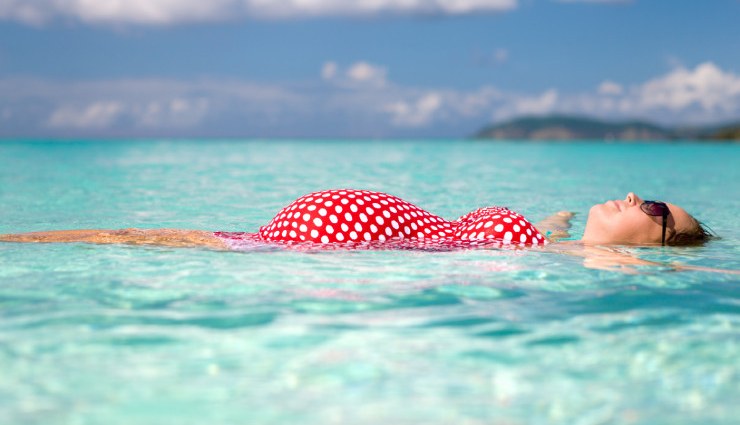Swimming is an excellent water sport that relaxes the body and mind. If you swim regularly, you are probably inclined to swim during pregnancy. However, you may be worried about the effect of swimming in pregnancy and want to consider the safety of the fetus first. For this reason, we suggest you stay with us until the end of the article to get more information about swimming during pregnancy and the essential related points.
Swimming safety during pregnancy
If you take precautions, swimming during pregnancy is safe, and we can even say that no sport is as suitable as swimming during pregnancy. Swimming will help you stay fit and feel better during the physical changes caused by pregnancy without the risk of falling or serious injury. However, if you have just started swimming or have a high-risk pregnancy, you should consult your doctor, midwife, or physiotherapist to be sure.
Benefits of swimming during pregnancy
Swimming is an aerobic exercise for strength training and rehabilitation. In swimming, water allows you to float regardless of the weight you gain during pregnancy. For this reason, the third trimester of pregnancy is a unique time to enter the water. Swimming during pregnancy has many benefits, the most important of which we have explained below.
1. Create peace
Swimming balances cardiovascular and muscular strength and relieves stress. Like other exercises, swimming stimulates your body to release endorphins. This substance reduces pain and makes you feel better during pregnancy.
2. Eliminate swelling and pain
The growing uterus puts pressure on the body, but the natural buoyancy of water makes you feel light. Swimming helps to strengthen the muscles around joints and tendons and reduces joint and back pain.
3. Improve cardiovascular fitness
Short-term heart rate stimulation is beneficial for heart health. Swimming is a cardiovascular exercise that improves lung capacity and allows you to breathe more easily. It also increases your endurance during childbirth and reduces the possibility of your fatigue.
4. body strengthening
Swimming engages a group of arm and leg muscles and increases muscle volume. Since you gain weight during pregnancy, your muscles lose their endurance. This endurance is regained by swimming. Strengthening the muscles with hydrotherapy can shorten labor time as your muscles tighten, and contractions become more effective.
5. Avoid excessive heat
During pregnancy, body temperature increases naturally. This heat is caused by the increase in blood flow to the skin as well as the metabolism of the fetus. With the help of swimming, you can fight the heat and keep the body’s internal temperature at a suitable level.
6. Helping to place the fetus in the correct position
It seems that swimming helps to improve the condition of the fetus. Also, since the belly is light in the water, your body will be coordinated and may help with a “breech fetus.” Also, the fluctuation of fetal heart rate in women who exercise in water is less than in women who exercise on land.
7. Improve childbirth
Water sports such as swimming increase the size and strength of the muscles that help with delivery. On the other hand, swimming makes the thigh muscles strong and flexible, which makes childbirth faster and easier.
8. Improve sleep
After swimming, you feel relaxed, and the quality of your sleep improves. Swim during pregnancy with your doctor’s permission. However, every time you enter the water, take safety measures.
9. Improve mental health
According to the report of the World Health Organization, mental disorders such as depression are common in 10% of pregnant women and 13% of mothers after childbirth. According to studies, activity during pregnancy, such as swimming, improves mental health and reduces the possibility of mood disorders after birth. Getting out of the house and interacting with pregnant people in aerobic classes such as hydrotherapy or swimming will also expand your communication network, and you will receive friendly support after childbirth.
Other benefits of swimming during pregnancy
- improving blood flow ;
- strengthening the central abdominal muscles;
- preventing the separation of colon muscles;
- eliminating nausea and fatigue in the first trimester of pregnancy;
- reducing the pain and stretching of the round ligament due to the growth of the abdomen in the second trimester of pregnancy;
- Eliminating the swelling and discomfort of the legs and knees in the third trimester of pregnancy.
Essential tips for swimming during pregnancy

Swimming is safe and beneficial throughout pregnancy. Remembering a few things to do this exercise better would be best.
1. General notes
- Choose a pool close to home to avoid traveling a long distance and causing fatigue.
- Check the chlorine level of the pool. Chlorine can partially prevent water-borne diseases. Avoid drinking pool water (chlorinated or non-chlorinated) or river water in which you swim.
- Wear comfortable swimwear.
- If you can’t swim properly, use swimming gear.
- Be careful when walking on slippery surfaces.
- Do not swim in hot water. High temperature may cause pregnancy complications, especially in the first trimester.
- Keep your breathing steady with proper techniques. The fetus needs a constant oxygen flow, so don’t hold your breath.
- Listen to your body. If you have unusual pain or lightheadedness, consult your doctor.
- Swim for a short time at the beginning and gradually increase the time.
- Stop swimming before you feel tired or uncomfortable.
- Avoid rotating movements during pregnancy.
- Participate in pregnancy swimming classes with the help of a professional instructor.
- Do not swim in contaminated water.
- Take a shower after swimming.
- Drink enough water at least 2 hours before swimming to keep your body hydrated during exercise.
- Use indoor pools so that the sun and heat do not bother you. If you use outdoor pools, reapply your sunscreen every two hours.
Use snacks such as energy-rich snacks, fruit, or cereal to provide you with energy. Eat a snack at least an hour and a half before swimming, but avoid overeating so that your stomach is not complete while swimming. A heavy stomach causes discomfort. After swimming, eat a snack to restore your energy.
2. Tips for swimming in the first trimester of pregnancy
- If you have enough energy, swim first thing in the morning. This prevents morning sickness and provides power for your day. However, the smell of swimming pool chlorine causes nausea in some people.
- Swim for at least 20 minutes a day.
- Use pool equipment such as kickboards or noodles.
3. Tips for swimming in the second trimester of pregnancy
- You can lie in the water and swim backstroke without compromising your blood flow.
- Use maternity swimwear to be comfortable.
4. Tips for swimming in the third trimester of pregnancy
- Use appropriate maternity swimwear.
- You can use a swimming mask to reduce the pressure on the neck while breathing.
- Swim breaststroke to lighten the chest muscles and reduce the pressure on the back muscles.
- Avoid doing back crawls in the third trimester.
- If it is near the time of delivery, avoid breast crawl. Now, you can walk in the water instead of swimming.
If you swam before pregnancy, you can swim four days a week or 30 minutes daily. If you are new to swimming, start with 15 minutes and gradually increase the time.
Start swimming during pregnancy.

Swimming the pool length is a simple way to get aerobic exercise. If you have done long swimming before, you can do it according to your body condition. Pregnancy may make you tired, so swim shorter and more intermittently. Instead of pushing yourself, pay attention to how you feel. If you are familiar with different swims, try them out and see how you feel. If you like butterflies, you may find that simple breaststroke is better for you now. You may also skip the spins and get help from the wall.
Pregnancy is tough, so if you feel like sprinting is excellent, do it with your doctor’s advice. If you have never swam before, don’t swim too fast. Generally, starting new sports during pregnancy should be done with caution. Sticking to the exercises you have been doing back is usually recommended.
Warning signs to stop swimming
Stop swimming if you experience these symptoms:
- lower abdominal pain;
- vaginal spotting;
- fluid secretion;
- uterine contractions;
- irregular heartbeat;
- Lightheadedness or dizziness.
You should avoid swimming if you have a history of specific problems, including:
- multiple abortions;
- cervical weakness;
- membrane rupture;
- Epilepsy with poor control;
- Lung or heart diseases.
Common questions
1. Is swimming in cold water harmful during pregnancy?
Yes. Swimming in cold water may cause uterine contractions. The ideal temperature for swimming during pregnancy is 25.5 to 29 degrees Celsius.
2. Can pregnant women swim in the river?
Yes. Swimming in the river during pregnancy is safe for women if safety precautions are followed. Just make sure the water is not contaminated. Also, know that swimming in the river keeps the body cool.
3. Is swimming in the sea harmful for a pregnant woman?
No, Going to the sea during pregnancy is not dangerous for the body. Just try to be a close family member. Also, do not swim in very cold or very hot water. The immune system of pregnant women changes a little and may make them susceptible to infectious diseases. So make sure the water is clean. Abdominal pain and cramps, diarrhea, and vomiting are common symptoms of infection.
4. Is chlorine pool water harmful for pregnancy?
No, So far, no reports have been published about the harmfulness of chlorine in swimming pool water for pregnant women or fetuses or its pregnancy complications.
5. Does water enter the uterus while swimming?
No During swimming, water does not enter the vagina.
6. What movement is suitable for swimming during pregnancy?
Freestyle, side crawl, backstroke, and breaststroke are fine as long as you are comfortable.
you say
How familiar are you with swimming during pregnancy? Have you tried this effective exercise at this time? You can write us your experience and opinion in the comments section and share this article with your friends through social networks.
Warning! This article is only for educational purposes; to use it, it is necessary to consult a doctor or specialist.



